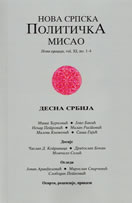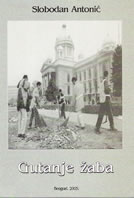| NSPM in English | |||
Kosovo is without a doubt the darkest corner of Europe |
 |
 |
 |
| среда, 03. март 2010. | |
|
Mr. Secretary-General, Respected High Commissioner, Excellencies, Ladies and Gentlemen, It is my honor to address the United Nations Human Rights Council, and to express my country’s active support for its work. Before turning to the issues that have brought us to Geneva, I would like to express my deepest condolences to the Government and people of the Republic of Chile in the wake of the tragic earthquake that claimed hundreds of human lives and resulted in tremendous destruction. Our thoughts and prayers are with the families of the victims. Excellencies, Human rights are essential for achieving the progressive, equitable development of mankind. They facilitate our embrace of a global diversity of views on the basis of a commitment to dialogue and mutual respect. They make us stronger as a world community, by endowing us with the ability not only to promote the peaceful resolution of disputes, but also the reconciliation of peoples. My Government is proud of its record as a leader in human and minority rights protection in Southeast Europe. We have nearly accomplished our goal of total compliance with all relevant international standards. During this Session of the Human Rights Council, the Special Representative of the UN Secretary-General on the Rights of Internally Displaced Persons, and the Special Rapporteur on Freedom of Religion or Belief, will both present what we confidently believe will be positive reports on their respective recent visits to my country. And in May 2010, we will defend our report in this Council on implementing the Optional Protocol to the Convention on the Rights of the Child on the Sale of Children, Child Prostitution and Child Pornography. In accordance with the new procedures of the Universal Periodic Review, we have submitted a comprehensive report to this Council on our work since 2008. It proposes a decisive set of measures we intend to take in order to overcome the few challenges that still have to be addressed. This includes completing the process of harmonizing our national legislative framework with existing human rights conventions, protocols, and covenants. Allow me to highlight in particular last year’s adoption of a landmark Anti-discrimination Law, as well as a National Strategy for the Protection of Roma, together with the appointment of the first Ombudsman in the history of Serbia. We have also strengthened the effectiveness of existing domestic mechanisms, such as our Persons with Disabilities, Gender Equality, Rights of the Child, and National Minorities Councils. In addition, I should like to point out that the Serbian Ministry of Human and Minority Rights signed a Memorandum of Cooperation with NGOs, in order to enhance the already close working relationship between the public sector and civil society on these issues. Excellencies, Serbia is a place of tolerance, in which close to 30 ethnic communities live harmoniously together, not just side by side. We are dedicated to the promotion of cultural and confessional diversity, the handmaiden of human rights protection. We believe this to be a source of strength, and we embrace the view that individual cultures and faiths thrive when they come into contact with others. But there is a place within the constitutional borders of the Republic of Serbia where human rights standards fall well below acceptable minimums: Kosovo and Metohija. On the basis of Security Council resolution 1244 adopted in June 1999, our southern province falls outside of the direct jurisdiction of our Government institutions. Standing in stark contrast to the rest of Serbia, the state of human rights there is dismal. In that respect, Kosovo is without a doubt the darkest corner of Europe. In the last decade, the population of Kosovo Serbs, Roma, Bosniaks and others has been cut by half. According to the UNHCR, more than 210,000 remain internally displaced. In addition, hundreds of others have been killed, and thousands more have disappeared without a trace—including many whose organs were subsequently harvested in camps located in northeastern Albania. Tens of thousands of homes and businesses have been destroyed, and tens of thousands more have been illegally occupied. The UN Committee on Human Rights has harshly criticized the lack of human rights protection in Kosovo, concluding that “discrimination against Serbs and Roma is widespread.” Amnesty International has echoed those words. The UNHCR has even recommended against returning Kosovo Serbs and Roma to areas largely populated by ethnic Albanians—while the UN Special Rapporteur has concluded that “today’s chief obstacles to sustainable returns are the entrenched patterns of discrimination, lack of access to employment and livelihoods and too few schools for minorities.” Moreover, Human Rights Watch has reported that “Kosovo is a place where human rights are frequently violated, where political violence, impunity for common and political crimes, intimidation and discrimination are commonplace. […] Organized crime [is] largely unchecked, […] witness harassment is widespread, […] domestic violence is a serious and prevalent problem, […] and trafficking of women remains a serious issue.” In addition, endemic corruption in Kosovo remains a serious problem. Transparency International reported that the province ranks as one of the four most corrupt economies in the world. One of the most significant sources of revenue is drugs trafficking, with Kosovo serving as a principal transit point along smuggling routes between Central Asia and Western Europe. All this terrible evidence helps to explain why last spring, Freedom House categorized Kosovo as “Not Free”—the worst possible classification this leading international watchdog organization can bestow. Excellencies, Since June 1999, more than 150 Serbian Orthodox monasteries and churches have been destroyed in wanton acts of cultural cleansing, including 35 in a blitz pogrom in March 2004. While some holy sites have been reconstructed, the overall situation is far from normal. Not a single participant in the March 2004 pogrom remains incarcerated, and the few who were convicted were not prosecuted for hate crimes, but rather disturbing the peace or some similar misdemeanor offense. We hope the recent appointment by the EU of a status-neutral Facilitator for the Religious and Cultural Heritage of the Serbian Orthodox Church in Kosovo will contribute to countering what the Special Rapporteur characterized as “the worrying trend of coercion and violence in the name of religion.” Let me pause for a moment to underline the fundamental significance of these living religious communities, and of Kosovo more generally, for the Serbian people. The province’s Serbian Orthodox holy sites—some of which have been placed on UNESCO’s List of World Heritage Sites, and alarmingly, on its List of World Heritage in Danger—stand at the foundation of our identity. They are not mere monuments or museums. They are as much a part of our national past, as they will be of Serbia’s proud European future. That is why we share the grave concerns of the Special Rapporteur that “some Serbian Orthodox monasteries and religious sites were being presented by the Kosovo authorities without mentioning their Serbian origin and cultural heritage,” adding that Pristina persists in denying this in “official reports and public presentations.” We are also critically concerned that Kosovo’s ethnic Albanian authorities continue to ban the use of the Serbian Cyrillic alphabet in public places—from road signs to schools and hospitals, official documents and buildings to the media. Excellencies, These assessments are central to understanding the dark reality of Kosovo today. It should shock the conscience of this Council, and is an integral part of the tragic context in which the February 17th, 2008, unilateral declaration of independence by Kosovo’s ethnic Albanian authorities must be viewed. This attempt at secession has brought into question the fundamental tenets of the contemporary international system. And it has divided the world. Two-thirds of UN member States have not supported it, continuing to respect the sovereignty and territorial integrity of my country. I would like to reiterate our deep gratitude for their principled solidarity and dedication to uphold international law, as we seek to resolve Kosovo’s future status peacefully, through diplomacy and dialogue. In conclusion, I want to reiterate that when it comes to human and minority rights, Serbia will stay the course. We will continue to improve our record, and keep adhering to the highest standards of protection—not only because this is our international obligation, but because we do believe that it must be everybody’s moral imperative to do so. That is what the framers of the Universal Declaration of Human Rights meant when they encouraged us to use it as a “standard of achievement.” But it is more than that. It is the first global statement to affirm the inherent dignity and equality of all human beings, a framework for the ultimate triumph of peace and reconciliation. It is to the advancement of this noble aspiration that we must now dedicate all our strength. Thank you for your attention. |
Од истог аутора
- Из архиве - Remarks Before the Foreign Affairs Committee of the European Parliament
- From Balkan Wars to Balkan Peace
- Serbia is dedicated to solving all differences at the negotiating table
- Our Kosovo policy will not change
- 2009 was Serbia’s best EU accession year ever
- We will never recognize UDI
- Serbia, the United States, and the Riddle of Europe
- Serbia will be a bridge between the European Union and the African Union
- Kosovo is our Jerusalem
- Minister of Foreign Affairs Vuk Jeremic’s Speech at the UN SC
- Address Before the Second Serbian Ambassadors’ Conference
- One Nation, Indivisible
Остали чланци у рубрици
- Playing With Fire in Ukraine
- Kosovo as a res extra commercium and the alchemy of colonization
- The Balkans XX years after NATO aggression: the case of the Republic of Srpska – past, present and future
- Из архиве - Remarks Before the Foreign Affairs Committee of the European Parliament
- Dysfunction in the Balkans - Can the Post-Yugoslav Settlement Survive?
- Serbia’s latest would-be savior is a modernizer, a strongman - or both
- Why the Ukraine Crisis Is the West’s Fault
- The Ghosts of World War I Circle over Ukraine
- Nato's action plan in Ukraine is right out of Dr Strangelove
- Why Yanukovych Said No to Europe

.jpg)








 Mr. President,
Mr. President,













